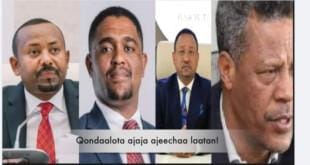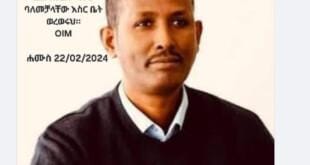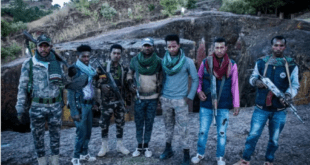By Galmo Mulataa A
Tradition and culture are determiners of people’s behavior. They are key factors that shape a given society’s behaviour. If you know the culture and tradition of a given group of people you will certainly be better equipped to know this people’s way of life and behaviour. The arrival of 21st century would not have much effect on such comportment. In the following paragraphs I will attempt to deal mainly with some aspects Abyssinian/Habasha political culture or tradition. I will describe what I see exists in reality among the Abyssinian political elites. Mind you, I am not biased against any group of people, including Amharas and Tigreans, whom I respect, but I do despise their political elite.
A good knowledge of the past should enable us to see better into the future. And the further one searches into the past, the further one will be able to see into the future. Thus it is said that the past is a good teacher of the future. If we look back into the political history and culture of Abyssinians over the last one and a half century, we will discover one very important fact. That is, there never has been a peaceful transfer of political power or loosening of their grasp on the Oromo and others. It is not in Abyssinian political culture to accommodate others’ political views, even of their kin. Suspicion is part of their tradition. It is common for a man to be suspicious of his wife, his sons, brothers or any other members of his family leave alone outsiders. I have a reasonable doubt that this political culture has changed.
In the Abyssinian political tradition, it is not unusual for a father to kill his son(s), brothers and their sons and other close relatives whom he suspects of aspiring for political power. Or a son or brother may conspire to get rid of the father or brother in order to clear the way for political power. Or an individual holding political power may imprison others who may have legitimate claims to power. There are several examples of such misdeeds in Abyssinian political tradition. There are cases in which a king castrated young boys who might have had legitimate claim to the throne so that they and their descendants would not be a threat to himself and his own descendants. Abyssinian court chronicles are full of such evil deeds. I have a reasonable doubt that the modern Abyssinian political elites will willingly abandon this political culture.
The priority of Abyssinian rulers has always been to keep themselves in power at any cost. Never have they exercised peaceful transfer of political power. They have never represented the people, including the people they originate from, and thus have had popular accountability. Democracy is alien to them. This is what the Tigrean elites ruling the Empire today represent. I have a reasonable doubt that Tigreans will ever allow Oromos and others to be free from under their rule without demand.
Perhaps we can start from Tewodros’s time. This was the man Amhara Abyssinians almost worship as the architect of the idea and ideology for their empire building – the greater Ethiopia. He was a rebel who ousted his own father and mother in-laws from power.
Yohannes, a Tigrean, destroyed Tewodros by assisting the British army to enter the region and locate Tewodros. The Gondares, who still regard Tewodros as their hero and love him, never forgot or forgave the destruction the traitor Yohannes brought upon them. When Yohannes became the emperor of Abyssinia, he followed Tewodros’s plan to build a greater Abyssinia (that later became Ethiopia); particularly by using his vassal king Minilik to conquer a large part of the present Empire. Minilik, on the other hand, used European mercenaries and local collaborators to conquer Oromia and the rest and in the end eliminated the leading Oromo collaborators. At Minilik’s demise, there was conflict concerning the legitimate inheritance of power between Iyasu and the Abyssinian core. The Iyasu group was liquidated and his descendants were kept in chains for over half a century. I have a reasonable doubt that Habasha political elites will be different this time around and free from political greed.
When Haile Sellassie ran away at the arrival of Italians, Oromos fought and defeated the occupying European power almost single handedly, yet it was the Abyssinians who returned to power. The case of the TPLF is not much different. There was no feeling of shame at all. They used the myth of their origin and simple lies to defraud Oromos. In Oromo culture, a lie (sobduu) is a taboo. However, among some Abyssinian groups a lie is a virtue. This is evident in the Tigrean group now ruling the Empire. Unfortunately the Oromos have yet to learn from their own experiences. Of course the collaborating Oromos are sell outs. I have a reasonable doubt that Abyssinian political elites will run short of Oromo collaborators soon.
In the mid-1970s, when only very few Oromos formed or joined the OLF, several brilliant young Oromo sons and daughters innocently joined young Abyssinians hoping to change the nature of the Empire to better serve the inhabitants of the Empire, including the Oromo people. They were swindled and many were slaughtered; others perished in the prisons and still others were exiled. The few who regretted their involvement at some stage have come back and joined their own people’s liberation struggle. In 1989-91 in particular, the Tigreans (TPLF) recruited many Oromo war prisoners and used them to fight the Derg army, particularly in Gondar, Gojam, Wallaggaa, Shawa, etc. The same group was later used as camouflage to trick and mislead the Oromo people. This Oromo group, just like its predecessors, was used as a decoy by the Tigrean political elites. Then one would think that other Oromos would learn from the misdeeds of this group. Instead we continue to see Oromo groups aspiring to join the occupiers to give false hope to the Oromo people. This group’s imprudent acts will only prolong the suffering of our people under alien rule. It is evident that this is a curse the Oromos must overcome (falachu qabna!). I have a reasonable doubt that Oromos can liberate themselves by collaborating with the same group that enslaved them in the first place. Political power is not given but demanded and seized. Frederick Douglas once said – “power concedes nothing without demand”.
Oromos have a long time relationship with their neighbours including the Habasha. For the past 5-7 generations or more, the Oromo leaders have tried to work with Abyssinian leaders in an attempt to regain their lost rights. Without exception they were all swindled. We also cannot forget those who have denied or hidden their identity and committed to serving their masters, working against their own people for selfish reasons.
In animal communities, including human, when it comes to preservation it starts with ‘you’, the family and your community or group. Those of you who have flown recently must have heard part of the instruction of the lead flight crew which in essence goes something like this: …if there is shortage of oxygen in the cabin the oxygen mask will drop down. Put the mask on yourself first and then help others …. There is also an Oromo saying that goes like this: Haati dursitee qaanqee if irraa buuftee boodarra dhala iseerraa buufti. Of course, this is not selfishness. It is evident that the ABO is following this sensible guide in its struggle for freedom and peace. On the other hand, ABO, just like the society it came from, greatly cares for its neighbours. It fully understands that in the absence of peace and stability in its neighbourhoods Oromos may not have a lasting peace and prosperity. On the other hand, if Oromos are not free they may not possibly talk or care about their neighbours. As far as I could understand, the OLF has from the start always sought and in many instances obtained the cooperation of its neighbours and tirelessly continues to work to maximize this.
Recent development shows that a certain Oromo group who worked hard during their youth to maintain the Empire through their membership in EPRP, MEISON, WPE, etc., doesn’t seem to have lost hope in the Empire and has come back to mislead our people, particularly the Oromo youth, proclaiming that the road to salvation for Oromos is through the Empire. There seems to be no logic to the efforts they are making except that it is for the ‘crumb’ of power that the owners of the Empire might throw at them. Their path will lead nowhere except to create confusion among Oromos that could only be advantageous to the adversary and may delay the arrival of the inevitable BILISUMMAA!I have a reasonable doubt that these Oromos who labor at courting Abyssinian cooperation to set the Oromo people free will ever succeed.
There are those who incessantly remind us that we are in the 21st century, as if the rest of us are on another planet. They should be reminded that time is a continuum and knowledge is cumulative. More importantly, the longing for and the pursuit of bilisummaa (freedom) is eternal.




